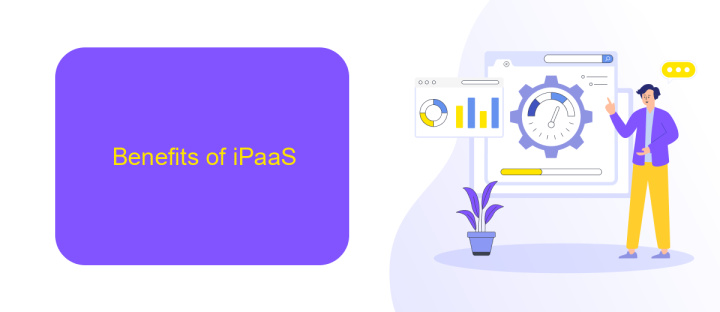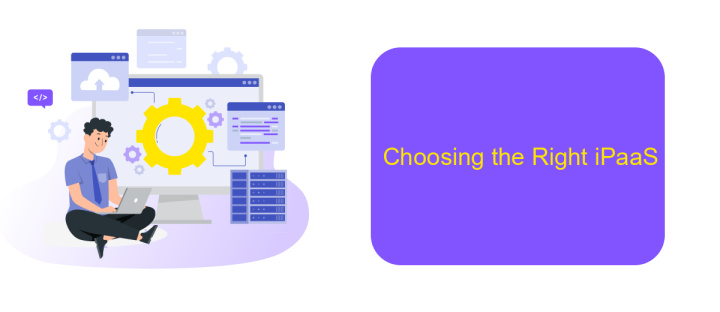Why iPaaS
In today's fast-paced digital landscape, businesses are increasingly turning to Integration Platform as a Service (iPaaS) solutions to streamline their operations and enhance connectivity. iPaaS offers a seamless way to integrate various applications and data sources, ensuring efficient workflows and real-time data access. This article explores the compelling reasons why iPaaS is becoming an essential tool for modern enterprises.
Introduction
In the rapidly evolving digital landscape, businesses are increasingly relying on integration Platform as a Service (iPaaS) solutions to streamline their operations. iPaaS offers a centralized platform to manage, integrate, and automate various applications and data sources, enhancing efficiency and reducing complexity.
- Seamless integration of disparate systems
- Real-time data synchronization
- Scalability to accommodate business growth
- Cost-effective solution compared to traditional integration methods
One notable player in the iPaaS market is ApiX-Drive, which simplifies the process of connecting various applications without the need for extensive coding. By providing a user-friendly interface and robust automation capabilities, ApiX-Drive empowers businesses to achieve seamless integrations, ensuring that data flows effortlessly across their systems. This not only saves time but also allows companies to focus on their core competencies, driving innovation and growth.
Benefits of iPaaS

iPaaS, or Integration Platform as a Service, offers numerous benefits for businesses looking to streamline their operations. One of the key advantages is its ability to seamlessly connect various applications and data sources, enabling efficient data flow and improved collaboration. This integration capability reduces the complexity of managing multiple systems, allowing organizations to focus on their core activities rather than dealing with technical hurdles.
Additionally, iPaaS solutions like ApiX-Drive provide user-friendly interfaces that simplify the process of setting up and managing integrations. These platforms often include pre-built connectors and templates, making it easier for businesses to automate workflows without extensive coding knowledge. By leveraging iPaaS, companies can quickly adapt to changing business needs, enhance operational efficiency, and gain a competitive edge in their respective markets.
Types of iPaaS

Integration Platform as a Service (iPaaS) solutions come in various types, each catering to different business needs and technical requirements. Understanding these types can help organizations choose the most suitable platform for their integration projects.
- Cloud-based iPaaS: These platforms are hosted on the cloud and offer scalability, flexibility, and ease of access. They are ideal for businesses looking to minimize infrastructure management.
- On-premises iPaaS: These solutions are deployed within a company's own data centers, providing greater control and security. They are suitable for organizations with strict compliance requirements.
- Hybrid iPaaS: Combining both cloud and on-premises elements, hybrid iPaaS solutions offer the best of both worlds. They are perfect for businesses needing a balance of flexibility and control.
- Specialized iPaaS: These platforms focus on specific industries or types of integrations. ApiX-Drive, for example, specializes in automating workflows and integrating various services with minimal setup.
Choosing the right type of iPaaS depends on factors such as the complexity of integrations, data security needs, and budget constraints. Platforms like ApiX-Drive make it easier to automate and manage integrations efficiently, ensuring seamless data flow across different systems.
Choosing the Right iPaaS

Choosing the right iPaaS (Integration Platform as a Service) is crucial for seamless business operations. The ideal iPaaS should align with your specific integration needs, budget, and technical capabilities. It's essential to evaluate the platform's flexibility, scalability, and ease of use.
Start by identifying your integration requirements. Consider the types of applications you need to connect, the volume of data to be transferred, and the frequency of these transfers. An effective iPaaS should support a wide range of applications and data formats.
- Compatibility with existing software
- Ease of setup and maintenance
- Scalability to grow with your business
- Robust security features
- Cost-effectiveness
Platforms like ApiX-Drive offer user-friendly interfaces and extensive support for various applications, making it easier to set up and manage integrations without deep technical knowledge. By carefully assessing these factors, you can choose an iPaaS that enhances your business processes and drives efficiency.
iPaaS Case Studies
One notable case study of iPaaS (Integration Platform as a Service) involves a mid-sized e-commerce company that struggled with integrating various software systems. They faced issues with data silos and inefficient workflows, which hampered their ability to provide seamless customer experiences. By implementing an iPaaS solution, they were able to connect their CRM, ERP, and marketing automation tools effortlessly. This integration streamlined their operations, resulting in a 30% increase in productivity and a significant reduction in manual data entry errors.
Another compelling example is a healthcare provider that needed to synchronize patient data across multiple platforms securely. They chose ApiX-Drive for its user-friendly interface and robust security features. With ApiX-Drive, they managed to automate data transfers between their Electronic Health Records (EHR) system and appointment scheduling software. This not only ensured data accuracy but also improved patient care by reducing administrative burdens on healthcare staff. The integration led to a 25% improvement in appointment scheduling efficiency and enhanced patient satisfaction.
- Automate the work of an online store or landing
- Empower through integration
- Don't spend money on programmers and integrators
- Save time by automating routine tasks
FAQ
What is iPaaS?
Why should businesses consider using iPaaS?
How does iPaaS benefit small and medium-sized enterprises (SMEs)?
Can iPaaS handle complex integrations?
What should businesses look for when choosing an iPaaS provider?
Time is the most valuable resource for business today. Almost half of it is wasted on routine tasks. Your employees are constantly forced to perform monotonous tasks that are difficult to classify as important and specialized. You can leave everything as it is by hiring additional employees, or you can automate most of the business processes using the ApiX-Drive online connector to get rid of unnecessary time and money expenses once and for all. The choice is yours!


